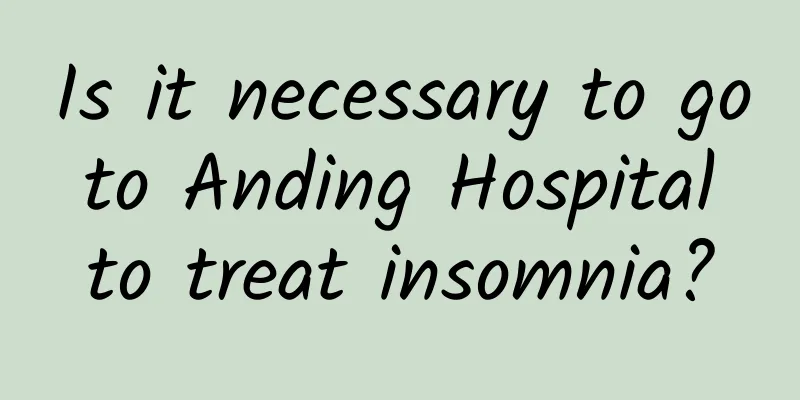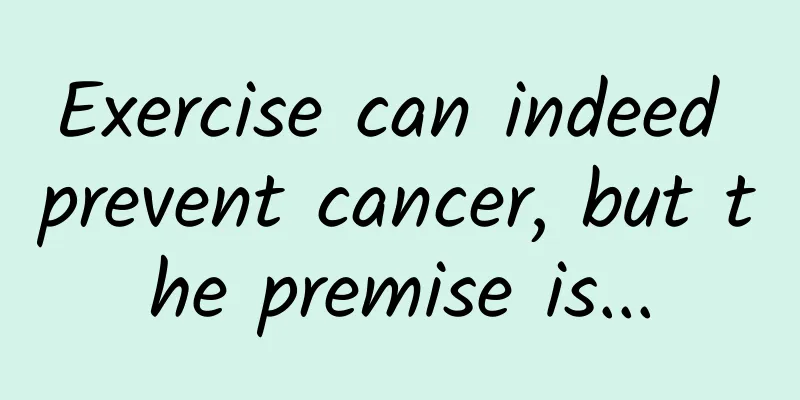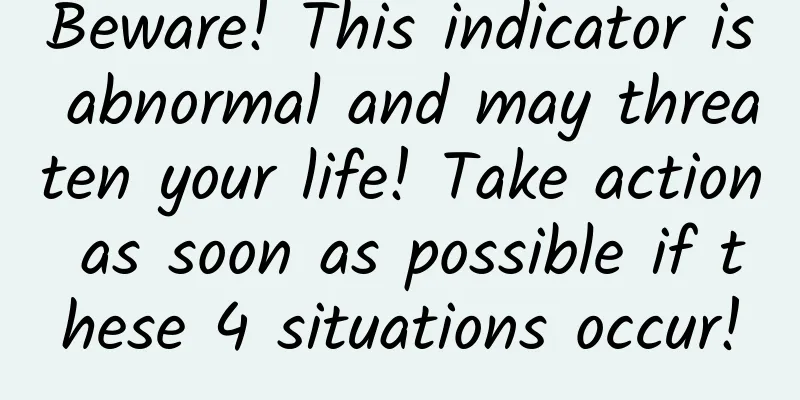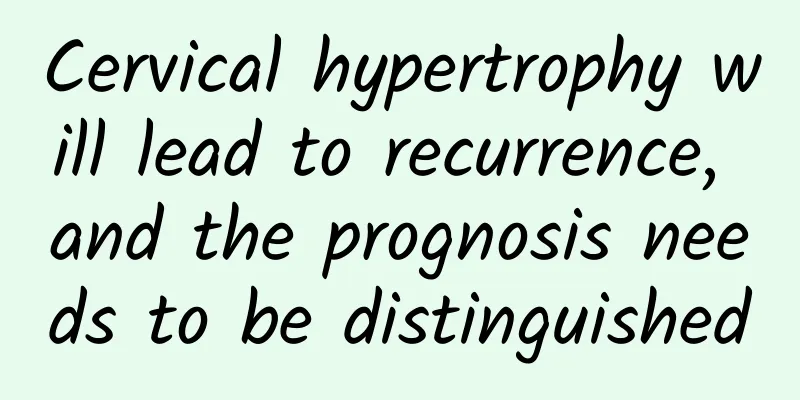Is it necessary to go to Anding Hospital to treat insomnia?

|
This is a 100% true experience article about insomnia treatment. The story is this: I was diagnosed with generalized anxiety disorder and autonomic nervous system disorder at the beginning of last year. I received a lot of treatment at that time, including drug intervention. After the symptoms of anxiety were initially alleviated, insomnia became more serious. Coupled with the heavy workload, my sleep has been getting worse this year. In August, the situation worsened. I slept no more than two hours a day for four consecutive days. I felt anxious, short of breath, chest tightness and fatigue all day long, and my work was seriously delayed. I saw that this was not going to work, so I had to go to the hospital as soon as possible. After searching, I found that only the Anding Hospital in my city had a sleep department. So I dragged my tired body and came to the legendary Anding Hospital with great curiosity. A few months later, I still feel it is necessary to share this experience. After all, there are many friends who suffer from insomnia, and many of them probably feel ashamed of "going to a psychiatric hospital to treat insomnia", or think that going to the hospital for insomnia is an exaggeration. If so, I hope my experience can help you. First of all, I would like to state that this article does not contain any advertising elements, treatment or consumption suggestions. It is merely an experience and discussion of sleep science and insomnia treatment. Therefore, all relevant information of hospitals and platforms will be hidden. In addition, before seeing a doctor, I also tried many sleep intervention programs that are often used and recommended by everyone. Including but not limited to listening to ASMR, taking melatonin, drinking hot milk, meditating, etc. These options are more or less useful, but basically they are effective at the beginning, but they are easy to be useless after a period of time. And my feeling is that if you put all your hopes for sleep on a specific option, once it fails, it will cause psychological collapse, which is counterproductive. A more effective solution may be to establish a scientific and mature sleep system, and regard these sleep-aiding factors as only a small part of it. It is good if it works, but it doesn't matter if it doesn't. Indeed, some of the sleep-aiding methods I used before were also included in the treatment plan given to me by the doctor. But I have to say that taking melatonin is an exception. I don’t feel good about taking melatonin myself, and sleep doctors don’t recommend taking additional melatonin, which may cause abnormal melatonin secretion (I hope friends who sell melatonin don’t look at this). Okay, now let me start telling you about my real experience. The sleep doctor recommended CBT-I cognitive behavioral therapy to me. Medication intervention and CBT-I treatment I discovered one thing. Every March 21, World Sleep Day, social media will be flooded with hot searches such as "How is your sleep?", "Do you suffer from insomnia?", and "More than 300 million people in China suffer from sleep disorders". Then there are "Top Ten Tips for Insomniacs" and "A Long Picture to Understand Insomnia", and a few popular science short videos. These online contents make us feel that we know enough about insomnia and sleep. But most people know nothing about the real science of sleep and sleep treatment - at least I feel that this is the case with me. Before the consultation, I thought that the sleep department would probably just prescribe a few boxes of sleeping pills. And it was because I had heard about the side effects of sleeping pills that I had not considered seeking medical treatment before. Later, I did get sleeping pills, but this was only the first step in the treatment. The doctor told me that most patients think that registering to see a doctor means getting a sleeping pill. However, sleep medicine does not agree with relying on drugs to assist sleep. On the one hand, sleeping pills have more or less side effects. On the other hand, although drugs have immediate effects, they will inevitably lead to drug dependence and drug resistance. In the long run, patients will enter a situation where they cannot sleep without drugs, or even cannot sleep after taking drugs, which will only make sleep disorders more serious. For patients who do have sleep disorders, that is, they sleep less than six hours for more than three days a week, sleep medicine recommends CBT-I cognitive behavioral therapy. It builds long-term interventions to help patients establish sleep habits and develop good sleep conditions. To be honest, I was a little hesitant when I first heard about the therapy consisting of four letters. Because we in the Internet industry know that if you can't write a PPT, you can just come up with an ABCD quadrant or XYZ methodology, which is basically just a trick. Moreover, this therapy includes keywords such as cognition, training, control, meditation, etc., which sound mysterious and don't seem like a common treatment method for ordinary people. I don't know if it's my expression that's wrong or if everyone feels the same way. The doctor specifically explained to me that CBT-I is currently the gold standard for treating insomnia disorders internationally. It has a very systematic scientific basis and very good clinical results. It can be said to be the best non-drug treatment for insomnia. For acute sleep disorders like mine, I first need to intervene with medication, then gradually transition to CBT-I and start to reduce medication, and ultimately hope to eliminate sleep disorders without the help of medication. Hearing such a promising prospect, and that it was a regular and stable hospital, I readily agreed to start CBT-I treatment. The doctor then helped me develop a three-month treatment plan, which would be extended if the effect was not satisfactory. He also asked me to fill out a lot of questionnaires, asking about anxiety, sleep, mental state, work pressure, etc., and also discussed and popularized some key issues. The first step in my treatment was to take half a sleeping pill before bedtime and sleep as long as I wanted. I just had to keep track of the time I went to bed and woke up. At the time, I thought, is it that simple? Little did I know that it might be the last time I woke up naturally. I have to say that taking sleeping pills is not as scary as I thought. There is no obvious discomfort or drowsiness, but I fell asleep naturally. Friends who really have sleep disorders do not need to be afraid of seeing a doctor. Sleep Recording and Sleep Pressure I won't go into too much detail about the concept of CBT-I therapy here. If you are interested, you may want to search for it. Its core includes five aspects: sleep restriction, stimulus control, relaxation training, sleep hygiene, and cognitive adjustment. It was originally used for chronic primary insomnia with continuous insomnia for more than half a year, but it is now also used to treat acute insomnia, such as me. Here I will just talk about how CBT-I works based on my own experience and feelings. According to the doctor, my condition is not serious in insomnia (of course, it may be pure comfort), and there are not many areas that require CBT-I intervention. The core is two points: record sleep conditions and gradually increase sleep pressure, and get rid of drug interference in the process. Sleep records include sleep time, sleep duration, wake-up time, sleep interruption time, sleep quality, etc. A very detailed sleep log should be filled out every day. The doctor will also adjust the treatment strategy based on the recent sleep log at each follow-up visit. In the first week of treatment, I could take half a pill and sleep until I woke up naturally. In the second week, I had to set a fixed time for sleeping and waking up while taking the medicine. I had to go to bed around 11:30 pm, and I could go later but not earlier; and I had to get up at 7 am, and I could go earlier but not later. In the third week, I lowered my medication dosage while keeping a fixed sleep schedule, and then stopped taking it. After a month, I gradually moved my wake-up time forward from 7 a.m. to 6:45 and 6:30 a.m. During the whole process, I couldn't sleep no matter how sleepy I was during the day, even for a short nap of about ten minutes. By now, everyone should know that the core of CBT-I is to improve sleep efficiency by limiting sleep time, which is the so-called sleep pressure. The doctor told me that when I first increase sleep pressure, I may not sleep well, and my sleep quality may deteriorate because I know I have to get up early. But I seem to have adapted to this process quite quickly. After all, I get up early in the morning and I am already very sleepy by the evening. I don’t have time to think so much - this also makes me deeply doubt whether my previous sleep disorders are actually caused by sleeping too much. During the whole process, the doctor will ask for a follow-up visit once a week or once every two weeks, depending on the medication and sleep pressure. The follow-up visit is not only about the next treatment plan, but also includes a lot of popular science knowledge about sleep and cognitive and behavioral suggestions. For example, the classification and coping methods of sleep disorders; to what extent insufficient sleep may cause health damage; what are good sleep hygiene habits, etc. I started CBT-I treatment on August 26th, and by October 12th, after about a month and a half, the doctor thought my treatment had been completed ahead of schedule. I could relax the sleep pressure restrictions, but I also had to set a fixed sleep time to maintain the treatment effect. From then until today, although my sleep disorder occasionally recurred, the overall condition was still good. In particular, I developed the habit of getting up on time at 7 o'clock in the morning, which was definitely beneficial. In the process of building sleep pressure, there are several things to pay attention to. First, do not try to prolong the time in bed, such as going to bed early or getting up late to improve sleep therapy, which often backfires; second, you must keep your habits stable and do not take naps, which still requires a certain amount of willpower; third, do not try to compensate for sleep, such as sleeping less the night before and sleeping more the next day, or making up for poor sleep on weekdays and sleeping on weekends. Forming good habits is the most important thing; fourth, try not to play with your phone or look at the screen before going to bed, and do not check the time when you wake up in the middle of the night to avoid external information causing sleep interference. In fact, the CBT-I treatment method has a set of formulas for calculating sleep pressure, but it is quite laborious to calculate that thing. If you already have trouble sleeping, don't add to your mathematical troubles. Just follow the doctor's instructions on the amount of sleep you need. CBT-I may sound mysterious, but the principle is actually very easy to understand - its core is conditioned reflex. If you can't fall asleep, it's probably because you're not sleepy enough or you're not used to sleeping at this time. Then gradually cultivate a sense of tiredness and improve your habits. This is a bit like practicing in drama school, where you do the somersaults at a very low height in the beginning, then increase the height little by little, until you finally have no thoughts outside of yourself and just lie down and fall asleep. In fact, to put it bluntly, this is the principle of Pavlov and dogs. Cognitive improvement and behavioral calibration Having said that, many of my friends may feel that CBT-I is quite simple and we can do it ourselves at home. Why go to the hospital and spend that money? After having been treated once, I have the opposite view. This is mainly because the backbone of CBT-I therapy is journaling and stress, but it involves much more than that. It includes a lot of cognitive improvement and behavioral calibration, and also requires scientific and experienced assessment of the patient's sleep, which are difficult for inexperienced people to achieve on their own. First, CBT-I therapy requires a thorough investigation to understand the symptoms and causes, and then gradually solve the problem based on these. This is a bit like psychotherapy, which is difficult to do on your own. Just like you can't solve all psychological problems with a sentence of "you think positively about everything". Then, CBT-I also involves a lot of small and specific cognitive adjustments, such as sleep hygiene habits. Many friends probably think that hygiene habits mean taking a shower before going to bed. In fact, the meaning of sleep hygiene is very rich, such as how to sleep undisturbed, how to act when you can't sleep so as not to make the situation worse, and the degree of contraindications of alcohol and caffeine, etc. The more extensive sleep cognitive adjustments may also include sleep expectations, sleep tolerance, sleep anxiety, etc., which is a very rich knowledge system. In addition, assisting sleep may require the participation of a lot of behaviors, such as exercising in the right way at the right time. Everyone knows that exercise helps sleep, but how to formulate exercise strategies based on different sleep disorders may still require scientific participation. There are also some behaviors that help sleep, which are also important components of CBT-I treatment, such as breathing training, progressive muscle relaxation, mindfulness meditation, etc. When it comes to meditation, many people think of some weird and mysterious things. But in fact, it is nothing more than a mechanism for attention training. Personal experience is very helpful for sleep. I will also insist on meditation training now, but the training method and training rhythm are better guided by a doctor to a certain extent. Last words The reason why I want to write about this "trip to Anding Hospital" and my experience with CBT-I treatment is that I feel that there are many friends who suffer from insomnia, but the proportion of those who are willing to go to the hospital for treatment seems to be very small. At least, when I talk to others about my experience of going to the sleep department, their first reaction is usually "Is it that serious?" "Is it necessary?" "Is it painful to take sleeping pills?" Especially when they hear that I went to Anding Hospital for sleep treatment, they often laugh in a strange and meaningful way. In fact, sleep problems are of course a type of mental problem. As society pays more attention to depression, it should also see that sleep disorders and other equally widespread mental problems exist. According to relevant data, yes, the data I saw on World Sleep Day, more than 300 million people in China have sleep disorders, and the insomnia rate among adults has reached 57%. In stark contrast, I didn't see any other patients in the sleep department except me. According to the doctors, most of the patients who come here are older, suffer from insomnia for many years, and even have other chronic diseases. Such patients need long-term behavioral and cognitive interventions, which are slow to respond and may even require more drugs and treatment equipment. Like many diseases, sleep disorders are best treated early. Many people who are susceptible to insomnia do not intervene or have a wrong understanding after acute insomnia attacks, which eventually leads to chronic insomnia. If measures are not taken until sleep disorders develop into serious problems or induce other chronic diseases, the role of CBT-I therapy will be very limited. At the same time, it is also recommended that you should find a scientific and formal insomnia treatment plan, and do not use melatonin recommended by friends or small folk remedies contributed by relatives. The effectiveness of CBT-I does not lie in how mysterious and profound it is, but in its comprehensiveness and superviseability, which requires the participation of professionals. Even if you take a step back, someone will take care of you and help you solve problems during sleep treatment, which is also a kind of psychological counseling. At the same time, I also learned that there are actually very few hospitals with sleep departments in China. For example, my city is not too small, but I only found one option. In addition, it seems that only sleep departments in provincial capitals and large cities have CBT-I treatment programs, and most areas still mainly provide sleeping pills. In this case, you might as well try CBT-I treatment in online hospitals. My work does not allow me to go to the hospital every week, and the treatment is mainly based on remote communication, and the effect is not bad. This proves that remote treatment should be feasible. In short, don't avoid sleep problems, face their existence, and only then can you solve the problem. Regardless of whether you get treatment or not, going to bed early and getting up early and not staying up late are the best sleep habits. Insomnia is not an incurable disease, and we don’t need to struggle with sleep. Patience and science are the best ways to deal with it. |
<<: Which type of swimming crab is better? Is it better to steam or boil the swimming crab?
>>: Can you eat prune skin? What kind of fruit is prune?
Recommend
What diseases can amenorrhea cause?
Once women experience amenorrhea, they must calm ...
What are the disadvantages of drinking black tea during menstruation?
As we all know, it is not recommended for women t...
【Medical Q&A】How to prevent Alzheimer's disease?
Planner: Chinese Medical Association Reviewer: Ti...
Is it normal to discharge a gestational sac during menstruation?
When a woman has an unexpected pregnancy and the ...
How much does a FamilyMart Christmas snowman bag cost? Is the FamilyMart Christmas snowman bag delicious? How does it taste?
We all know that FamilyMart is a popular convenie...
Skin care ingredients that are not good for pregnant women
Many pregnant mothers often have such doubts: &qu...
What color is Chanel 226 lip glaze? Chanel 226 lip glaze color test
Chanel 226 lip glaze is a new color for this autu...
ABI Research: Low-cost tablets accounted for 60% of the global market in 2016
Recently, a new report from market analysis compa...
What does Wang Jie think - Covering with a thick blanket, listening to music, counting sheep, taking melatonin, which one can really save insomnia
Recently, many people have asked me how to improv...
Can an ectopic pregnancy be born?
Ectopic pregnancy sounds scary and serious, and i...
Why do girls have so much leg hair?
Not only men have thick leg hair, but men with mo...
HCG peak occurs at several weeks of gestation
I believe that many female friends will first thi...
The spleen and stomach need to be maintained in all seasons. What should we pay attention to in terms of diet and exercise to regulate the spleen and stomach?
Author: Li Fangjie, Chief Physician, Wangjing Hos...
What should women eat during menstruation?
Nowadays, most women know very little about healt...
What should women do about neck wrinkles?
Many beauties think that facial care is enough, b...









